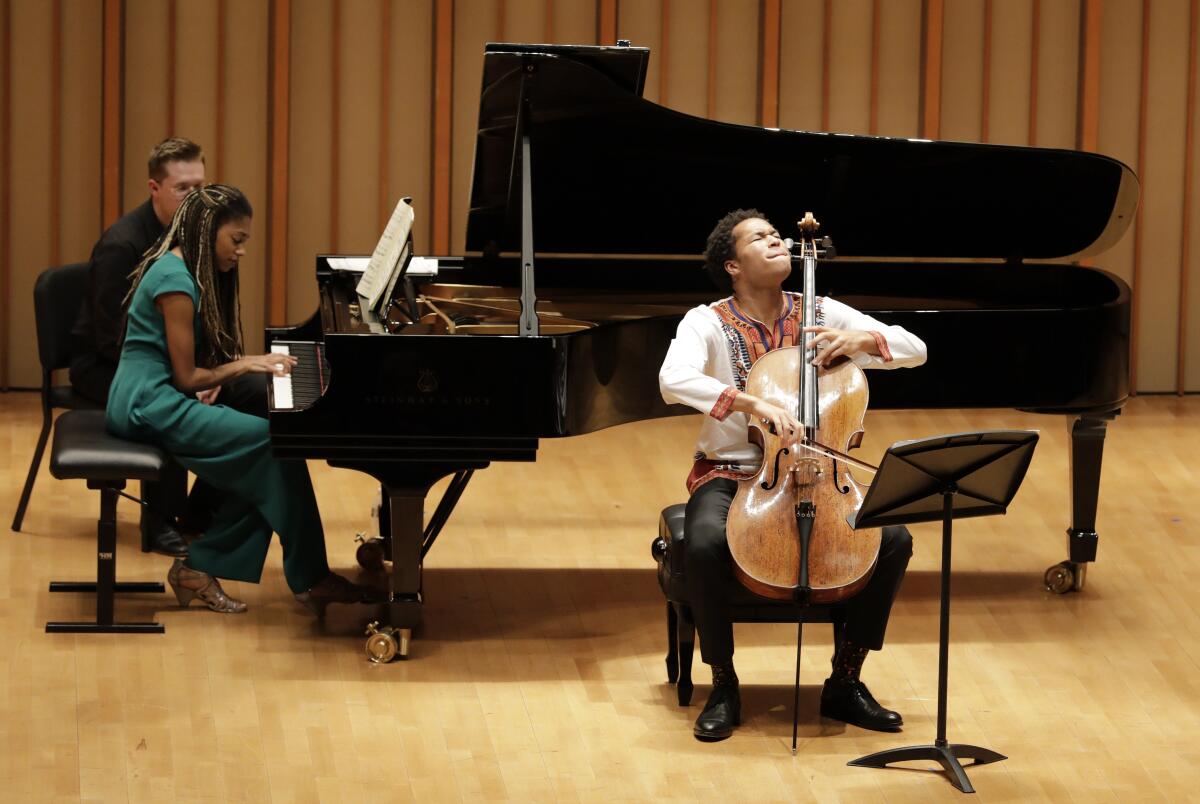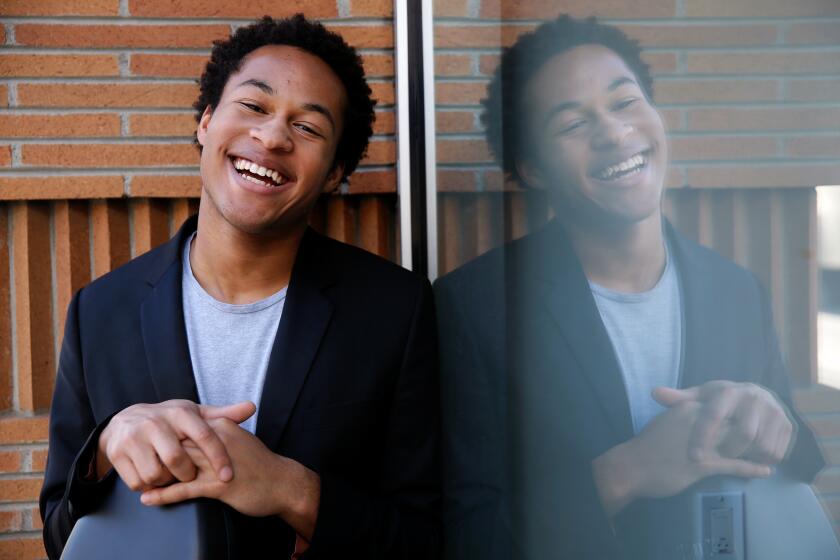For Sheku Kanneh-Mason, a critic’s hope that he’s allowed to grow into greatness

- Share via
Someday, Sheku may serve as a synonym for cello.
We’re already on first-name basis. “Sheku + Isata in Recital” was how the first American recital of the 20-year-old British cellist Sheku Kanneh-Mason and his 23-year-old pianist sister, Isata Kanneh-Mason, was billed at Zipper Hall on Tuesday night.
Sheku plays as though born to his instrument. The sweetness of his tone is a wonder to behold. He is an appealingly sure virtuoso. His vibrato is deep and penetrating. He embraces every passage in every piece with agreeable passion. Talent like this comes along rarely. Greatness feels within reach.
His sister is no slouch either, although a musician with a very different, cooler and more business-like personality. Hers is a silvery, percussive tone.
But it’s all about Sheku, who is already a near classical superstar thanks to a certain royal wedding. Two years ago, Prince Harry and Meghan Markle plucked the teenage cellist to class up their vows, with little regard as to how to sensitively foster the career of a remarkable prodigy. He looked great. He sounded great. He was inspirational, if bringing a saccharine glory to the crown in the process. Predictably, Sheku became an instant sensation far too early and thus fodder for the wolves of the classical music industry ever ready to cash in.
He signed a major recording contract and a strange mishmash of an album titled — what else? — “Inspiration” was quickly thrown together and just as quickly it rose to the top of the charts. Designed seemingly to maximize commercial potential with as many audiences as feasible, it contains a glowing live performance of Shostakovich’s First Cello Concerto with Mirga Grazinyte-Tyla conducting her Birmingham Symphony, along with various cello bonbons and attractive arrangements of Bob Marley and Leonard Cohen ripe for releases as money-making singles. Last summer Kanneh-Mason recorded Elgar’s autumnal Cello Concerto with no less than Simon Rattle and his London Symphony Orchestra. It comes out the first of the year, but a syrupy arrangement of Elgar’s “Nimrod” from the “Enigma” Variations from the sessions is already available as a single.
British cellist Sheku Kanneh-Mason, 20, talks about his careful development as an artist, including concert dates in Los Angeles, Berkeley, Boston and New York.
The grueling two-week recital tour, in which Sheku and Isata will hit Berkeley, St. Paul, Vancouver, Ann Arbor, New York, Boston, Baltimore, Kansas City and Philadelphia, in that order (good luck with weather), is troubling in many ways. The program, designed to show a young cellist’s musical maturity beyond his years, is the same in all venues.
It contains two highly Romantic early 20th century cello sonatas written by composers in their 20s, which might make sense for a young cellist just entering that decade. As curtain-raiser, though, came two short works. In the first, Beethoven’s “12 Variations on Mozart’s ‘Ein Mädchen oder Weibchen’” — Papageno’s aria from “The Magic Flute,” in which the bird catcher dreams of finding a sweet little dove for a wife — Sheku proved playful, wistful and at one point startlingly soulful. Next, a stark, dark, angry and obscure little Lutoslawski piece, “Grave: Metamorphosis,” to which Sheku brought a consoling lyricism, leaving the ferocity to Isata (who released her own solo recording of music by Clara Schumann over the summer but who seems even better suited to Bartók).
Barber’s Cello Sonata, written while the composer was still a student at the Curtis Institute in Philadelphia, was in 1932 a reactionary score, full of cliches and something that most cellists avoid. Perhaps Sheku thought it worthy of reexamination for an American tour, and he is probably not alone, given the general Barber revival. He pounded out the pounded-out parts of the first movement and brought a great show of feeling to the lyrical themes. When there was a hint of jazz, the cellist hinted better than most. Even so, the piano writing is better than the cello writing, and Isata here dazzled.
After intermission came Rachmaninoff’s Cello Sonata, written in 1901, just after the ultrapopular Second Piano Concerto but sounding far more adventurous and original than Barber (who to some extent aped Rachmaninoff’s language). Again, the piano part is at least, if not more, impressive (the same, to some extent, curiously, could be said for the Beethoven and Lutoslawski). Still, this is music in which Sheku sounded to be in his expansive, emotionally searching element.
He checked in with his sister from time to time, but mainly he gave the impression of being in a world of his own, offering his being up to Rachmaninoff. At his best in this sonata, he and the cello were one. Isata, on the other hand, kept Rachmaninoff’s romanticism at bay, clarifying textures and providing a foundation for her brother.
So, who is Sheku? He makes what he plays sound important, even when it isn’t. He produces passion on demand. His lyric gift knows no bound. There is a sweetness to his playing (even his recording of the Shostakovich concerto has little bite) that could become cloying if his tone and musicianship weren’t so elegant. Both he (in African shirt) and his sister (in a green jumpsuit) are stylish and original. But it is still too early, from the perspective of an audience member, to pierce beyond their fine polish as performers.
Sheku remains a student in London. He will be a different musician at 30 than he is now at 20; different at 40 than at 30. A tour, trapped in safe, impersonal repertory that has no real distinction, will perhaps be a learning experience. Only risk-taking and exploration of the music of his time and place will make him great.
Tuesday’s concert was a joint venture by the Colburn School and Los Angeles Chamber Orchestra, which had hoped to give Sheku his U.S. debut two years ago on a date that ultimately conflicted with the royal wedding. Colburn came through on its end, hosting a master class with the cellist and giving tickets to its students.
On the other hand, LACO, which was responsible for the printed program, handed out nothing but a glossy 5-by-8-inch flyer with incomplete titles of the pieces. No notes, no bios. In more ways than one, Sheku, who will finally make his LACO debut in May, deserved better.
More to Read
The biggest entertainment stories
Get our big stories about Hollywood, film, television, music, arts, culture and more right in your inbox as soon as they publish.
You may occasionally receive promotional content from the Los Angeles Times.












